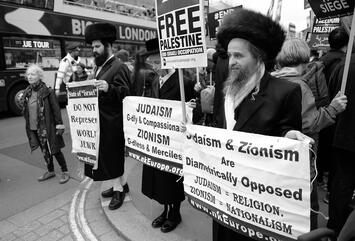
While Jews often seem clannish to outsiders, the reality is somewhat different: we have always suffered from a divisive streak of self-destructiveness. As far back as the levelling of the Temple and the expulsion from the homeland, Jewish unity has been undermined by both class divisions and theological disagreements. Two thousand years later, though General Titus’s legions may be forgotten, fissures and infighting remain.
Since October 7, there has been a very real upsurge in antisemitism in Europe and America. Some members of my own synagogue openly discuss whether they should attend services, or events such as menorah lightings; others are considering buying guns.
But despite this shared threat, the response of the Jewish community to events in Israel has been far from homogenous. This is, to some extent, nothing new. Extreme Orthodox Jews have long been a feature of pro-Palestine marches, maintaining that only God can sanction the return of the Jewish state. The equally extreme Black Hebrew Israelites, who maintain they are “the real Jews”, are also avowedly anti-Zionist.
What’s changed, however, is the growing schism inside the Jewish mainstream. Today, the overwhelming majority of American Jews still support Israel, especially among older and more Orthodox demographics. But, according to polling from 2021, less than half of Jews aged 18 to 29 feel emotionally attached to the state. If this new generation has a spirit, it is embodied in Green Party candidate Jill Stein; she may be Jewish, but employs the language of the antisemitic Left, evoking “genocide” and “apartheid” in her denunciations of Israel.
Yet such opposition to Israel goes well beyond the Leftist fringe. Just weeks after the attacks, the Union for Reform Judaism (URJ) — leaders of the largest denomination of Jews in North America — called for an immediate ceasefire, well before Israel’s offensive forced Hamas to start releasing hostages. It was met with a deserved denunciation by the Orthodox rabbinate, and divided many Reform Jews from their titular leaders.
For almost a decade, this schism has seemed inevitable, with Jewish theology graduates embracing the same “progressive fads” — from gender studies to notions of “colonialism” — that underscore so many of the West’s pro-Palestine movements. And in recent years, Netanyahu’s hard-Right coalitions have only emboldened these anti-Zionist arguments. For instance, a significant portion of liberal and centrist Jews rightfully object to the poor treatment of non-Orthodox Jews, as well as the relentless march of the settlers in the West Bank. For similar reasons, many are also horrified by what they perceive as antisemitism on the Right, whether associated with Elon Musk or those close to Donald Trump. The result is that, during the Netanyahu era, activist rabbis and prominent progressive-leaning Jews such as Peter Beinart have complained that “the Jewish establishment has asked American Jews to check their liberalism at the door”.
Over time, however, Hamas’s massacre and the concurrent rise of antisemitism in Europe and the US seem likely to weaken the case of these anti-Zionist progressive Jews. For while some liberals such as New York magazine’s Jonathan Chait cover the Left’s flank by insisting rising antisemitism is primarily a Right-wing phenomenon, it’s increasingly becoming apparent that Left-leaning institutions — with the university system at its epicentre — share much of the blame. We can see similar currents at play in a number of formerly pro-Jewish groups that now seem more interested in protecting Muslim antisemites than the rights of innocent Jews. Chief among them is the ACLU, which sent a letter to university presidents urging them not to investigate the potential connections between pro-Palestinian student groups and Hamas.
Read the rest of this piece at UnHerd.
Joel Kotkin is the author of The Coming of Neo-Feudalism: A Warning to the Global Middle Class. He is the Roger Hobbs Presidential Fellow in Urban Futures at Chapman University and Executive Director for Urban Reform Institute. Learn more at joelkotkin.com and follow him on Twitter @joelkotkin.
Photo: Alisdare Hickson Flickr, under CC 2.0 License.












